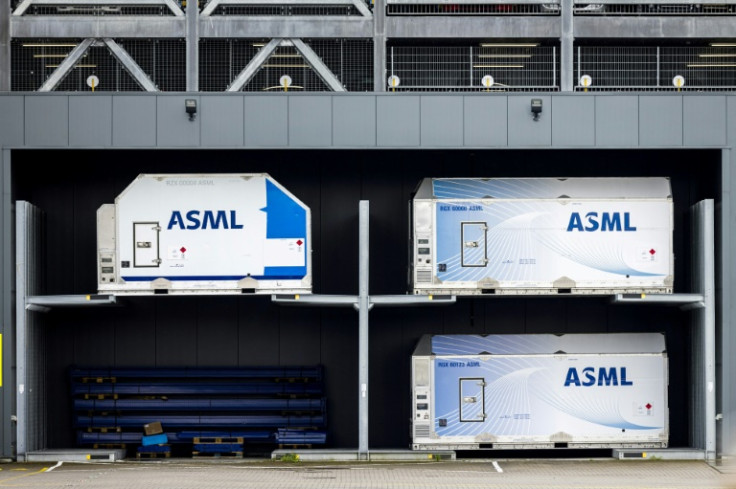ASML Profits, Bookings Down Amid China Chip Spat

Dutch tech giant ASML, which supplies chip-making machines to the semiconductor industry, on Wednesday reported a drop in net profits and orders amid a high-tech trade spat between China and the West.
Net profits came in at 1.2 billion euros ($1.3 billion) in the first quarter of the year, compared to 2.0 billion euros in profit the firm reported in the fourth quarter of last year.
Bookings slumped to 3.6 billion euros, a sharp decline from the 9.2 billion euros reported in the fourth quarter.
ASML is one of the world's leading manufacturers of equipment to make state-of-the-art semiconductor chips, which power everything from mobile phones to cars.
But the semiconductor industry has become a geopolitical battleground as the West seeks to restrict China's access over fears the chips could be used for advanced weaponry.
ASML announced this year that it had been blocked from exporting "a small number" of its advanced machines to China, amid reports of US pressure on the Dutch government.
Chief executive Peter Wennink said the firm was still upbeat for the second half of the year, which ASML has identified as a "transition" year before a stronger 2025.
"Our outlook for the full year 2024 is unchanged, with the second half of the year expected to be stronger than the first half, in line with the industry's continued recovery from the downturn," Wennink said in a statement.
Overall sales in the first quarter came in at 5.3 billion euros, lower than the 7.2 billion euros from the fourth quarter but in the range the company had forecast.
In its annual report published in January, the firm had forecast first-quarter sales of between 5.0 and 5.5 billion euros.
For the second quarter, the firm said it expected total net sales between 5.7 billion and 6.2 billion.
ASML employs 42,000 people worldwide, more than half of whom are based at the firm's huge complex in Veldhoven, in the east of the country, with a significant proportion coming from abroad.
That aspect of the business has hit the headlines in recent months with the surprise election win of far-right leader Geert Wilders, who wants to drastically crimp immigration.
The firm has said clearly that if it is unable to find the talent in the Netherlands, it could possibly be forced to look elsewhere, sending shivers down the spine of Dutch politicians.
Last month, the country unveiled "Operation Beethoven", a charm offensive worth 2.5 billion euros to keep global firms like ASML from moving abroad to attract foreign talent.
The semiconductor industry was at the heart of discussions between Dutch Prime Minister Mark Rutte and Chinese President Xi Jinping last month in Beijing.
Xi declared that "no force can stop the pace of China's scientific and technological progress" while Rutte said that any measures taken were not aimed at one specific country.
There are concerns Beijing may introduce its own export controls on gallium and germanium -- two rare earth metals critical for the manufacture of semiconductors.
© Copyright AFP 2024. All rights reserved.











